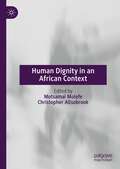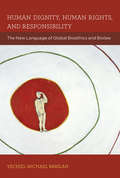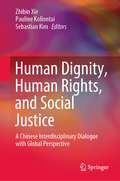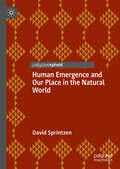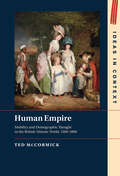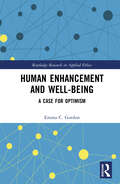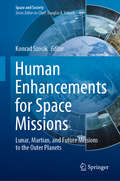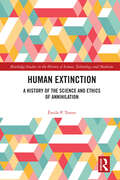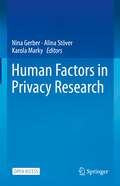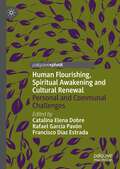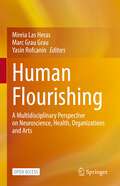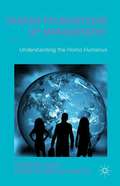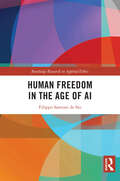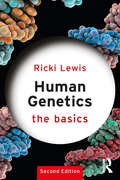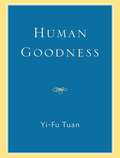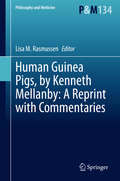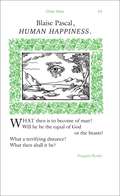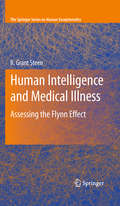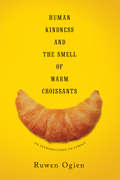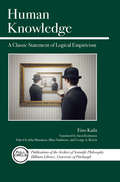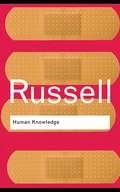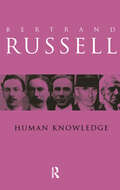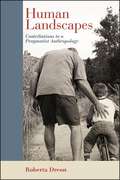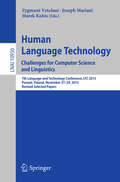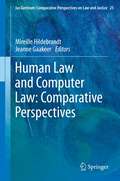- Table View
- List View
Human Dignity in an African Context
by Motsamai Molefe Christopher AllsobrookThis book is a contribution to African philosophy, by philosophers focusing specifically on the concept of human dignity in ethical theory. The concept of ‘human dignity’ denotes the intrinsic and superlative worth associated with human beings in virtue of which we owe them utmost moral regard. Although dignity is a foundational concept for African philosophy, there remains scant literature in African philosophy dedicated to critical and systematic reflection on the concept of human dignity. This volume responds to this lacuna by bringing together chapters that offer philosophical exposition, defense (or even rejection) and application of the concept of human dignity in light of intellectual resources in African cultures, such as ubuntu, personhood, and serithi.
Human Dignity, Human Rights, and Responsibility: The New Language of Global Bioethics and Biolaw (Basic Bioethics)
by Yechiel Michael BarilanA novel and multidisciplinary exposition and theorization of human dignity and rights, brought to bear on current issues in bioethics and biolaw.“Human dignity” has been enshrined in international agreements and national constitutions as a fundamental human right. The World Medical Association calls on physicians to respect human dignity and to discharge their duties with dignity. And yet human dignity is a term—like love, hope, and justice—that is intuitively grasped but never clearly defined. Some ethicists and bioethicists dismiss it; other thinkers point to its use in the service of particular ideologies. In this book, Michael Barilan offers an urgently needed, nonideological, and thorough conceptual clarification of human dignity and human rights, relating these ideas to current issues in ethics, law, and bioethics.Combining social history, history of ideas, moral theology, applied ethics, and political theory, Barilan tells the story of human dignity as a background moral ethos to human rights. After setting the problem in its scholarly context, he offers a hermeneutics of the formative texts on Imago Dei; provides a philosophical explication of the value of human dignity and of vulnerability; presents a comprehensive theory of human rights from a natural, humanist perspective; explores issues of moral status; and examines the value of responsibility as a link between virtue ethics and human dignity and rights.Barilan accompanies his theoretical claim with numerous practical illustrations, linking his theory to such issues in bioethics as end-of-life care, cloning, abortion, torture, treatment of the mentally incapacitated, the right to health care, the human organ market, disability and notions of difference, and privacy, highlighting many relevant legal aspects in constitutional and humanitarian law.
Human Dignity, Human Rights, and Social Justice: A Chinese Interdisciplinary Dialogue with Global Perspective
by Pauline Kollontai Sebastian Kim Zhibin XieThis book explores human dignity, human rights and social justice based on a Chinese interdisciplinary dialogue and global perspectives. In the Chinese and other global contexts today, social justice has been a significant topic among many disciplines and we believe it is an appropriate topic for philosophers, theologians, legal scholars, and social scientists to sit together, discuss, enrich each other, and then deepen our understanding of the topic. Many of them are concerned with the conjuncture between social justice, human rights, and human dignity. The questions this volume asks are: what’s the place of human rights in social justice? How is human dignity important in the discourse on human rights? And, through these inquiries, we ask further: how is possible to achieve humanist justice? This volume presents the significance, challenges, and constraints of human dignity in human rights and social justice and addresses the questions through philosophical, theological, sociological, political, and legal perspectives and these are placed in dialogue between the Chinese and other global settings. We are concerned with the norms regarding human dignity, human rights and social justice while we take seriously into account their practice. This volume consists of two main sections. The first section examines Chinese perspectives on human rights and social justice, in which both from Confucianism and Christianity are considered and the issues such as patriotism, religious freedom, petition, social protest, the rights of marginalized people, and sexual violence are studied. The second section presents the perspectives of Christian public theologians in the global contexts. They examine the influence of Christian thought and practice in the issues of human rights and social justice descriptively and prescriptively and address issues such as religious laws and rights, diaconia, majoritarianism, general equality, social-economic disparities, and climate justice from global perspectives including in the contexts of America, Australia, Israel and Europe. With contributions by experts from mainland China, Hong Kong, South Korea, Australia, New Zealand, the UK, USA and Norway, the book provides valuable cross-cultural and interdisciplinary insights and perspectives. As such it will appeal to political and religious leaders and practitioners, particularly those working in socially engaged religious and civil organizations in various geopolitical contexts, including the Korean Peninsula and Japan.
Human Emergence and Our Place in the Natural World
by David SprintzenThis book challenges the prevailing, though often unacknowledged, view among most practicing scientists and philosophers that human free will is incompatible with the natural causality that is the basic presupposition of modern science. That position is essentially based on the reductionist view of modern physics that all complex phenomena are thought to be ultimately causally explainable solely as a function of the action of their elemental constituents. The book argues that this mainstream opinion is the appropriate logical result of an inadequate conception of the way nature works. To show this the book first details the fundamental philosophical incoherence in the prevailing scientific world view. It then justifies the critique by outlining and re-describing some key findings of modern science, and presents three related alternative aspects by which we can understand the occurrence of natural emergence. In so doing it is suggested that emergence is a pervasive phenomenon in the natural world, and that human free will is an entirely understandable development of these natural processes, when properly understood, in which humanity is appropriately seen as a natural emergent within the evolutionary processes operating in accord with natural selection. Human Emergence and Our Place in the Natural World is essential reading for all philosophers of metaphysics and of science.
Human Empire: Mobility and Demographic Thought in the British Atlantic World, 1500–1800 (Ideas in Context)
by Ted McCormickArguing that demographic thought begins not with quantification but in attempts to control the qualities of people, Human Empire traces two transformations spanning the early modern period. First was the emergence of population as an object of governance through a series of engagements in sixteenth- and seventeenth-century England, Ireland, and colonial North America, influenced by humanist policy, reason of state, and natural philosophy, and culminating in the creation of political arithmetic. Second was the debate during the long eighteenth century over the locus and limits of demographic agency, as church, civil society, and private projects sought to mobilize and manipulate different marginalized and racialized groups – and as American colonists offered their own visions of imperial demography. This innovative, engaging study examines the emergence of population as an object of knowledge and governance and connects the history of demographic ideas with their early modern intellectual, political, and colonial contexts.
Human Enhancement and Well-Being: A Case for Optimism (Routledge Research in Applied Ethics)
by Emma C. GordonNew technologies and medicines make it increasingly possible to enhance human functioning in new ways: to become smarter, more emotionally attuned, and perhaps even morally better. But just because we can use the latest science to improve ourselves, should we? This book has two main aims. First, it outlines and criticises the six main contemporary arguments for scepticism about the role of human enhancements in promoting well-being. These arguments concern, respectively, (i) the value of achievements, (ii) freedom, (iii) hyperagency, (iv) human nature, (v) authenticity, and (vi) inequality. It will be shown – for the first time in a book-length treatment – why the overarching bioconservative case against enhancement doesn’t hold water. The second central aim of the book is positive; as we’ll see, each of the bioconservative critiques considered and rejected will be shown to nonetheless motivate a distinctive kind of theoretical desideratum that a viable positive enhancement proposal should satisfy. The remainder of the book then defends a two-part enhancement proposal that will be shown to clearly satisfy the theoretical desiderata that emerged from reflecting on the earlier critique of bioconservativism. The first part of the positive proposal motivates and outlines the general role of an enhancement counsellor in facilitating voluntary enhancement; I then offer an applied case study of this role in the special case of enhancement for the purpose of facilitating romantic and parental relationships. Human Enhancement and Well-Being: A Case for Optimism will be of interest to scholars and advanced students working in applied ethics, bioethics, philosophy of technology, philosophy of well-being, and social epistemology.
Human Enhancements for Space Missions: Lunar, Martian, and Future Missions to the Outer Planets (Space and Society)
by Konrad SzocikThis book presents a collection of chapters, which address various contexts and challenges of the idea of human enhancement for the purposes of human space missions. The authors discuss pros and cons of mostly biological enhancement of human astronauts operating in hostile space environments, but also ethical and theological aspects are addressed. In contrast to the idea and program of human enhancement on Earth, human enhancement in space is considered a serious and necessary option. This book aims at scholars in the following fields: ethics and philosophy, space policy, public policy, as well as biologists and psychologists.
Human Extinction: A History of the Science and Ethics of Annihilation (Routledge Studies in the History of Science, Technology and Medicine)
by Émile P. TorresThis volume traces the origins and evolution of the idea of human extinction, from the ancient Presocratics through contemporary work on "existential risks." Many leading intellectuals agree that the risk of human extinction this century may be higher than at any point in our 300,000-year history as a species. This book provides insight on the key questions that inform this discussion, including when humans began to worry about their own extinction and how the debate has changed over time. It establishes a new theoretical foundation for thinking about the ethics of our extinction, arguing that extinction would be very bad under most circumstances, although the outcome might be, on balance, good. Throughout the book, graphs, tables, and images further illustrate how human choices and attitudes about extinction have evolved in Western history. In its thorough examination of humanity’s past, this book also provides a starting point for understanding our future. Although accessible enough to be read by undergraduates, Human Extinction contains new and thought-provoking research that will benefit even established academic philosophers and historians.
Human Factors in Privacy Research
by Nina Gerber Alina Stöver Karola MarkyThis book covers topics needed to be considered in research around usable privacy. The book starts from a psychological perspective and introduces readers to basic behavioral theories and models that can explain end-user privacy behavior (including the “privacy paradox”) on a theoretical level. Subsequently, an introduction to different study methods (e.g., experiment, survey, interviews, co-creation) used in usable privacy research is given. Based on this, different methodological aspects, such as identifying appropriate questionnaires, and applying User-Centered Design, will be discussed. Finally, the book describes application areas for privacy research such as dark patterns and presents solutions for privacy protection, e.g., regarding consent-giving and PETs. The book aims to bring together the different research approaches to the topic of usable privacy, which often originate from computer science, psychology, and law, and provide a methodologically sound basis for researchers who want to delve deeper into this topic.This is an open access book.
Human Flourishing, Spiritual Awakening and Cultural Renewal: Personal and Communal Challenges
by Francisco Díaz Estrada Catalina Elena Dobre Rafael García PavónThis book seeks to generate a theoretical and a reflective framework to re-connect people with culture and spirituality. It seeks to recreate important links between these domains to provide interpretative, foundational, and ethical perspectives. It is distinctive in that it focusses on the challenges that humanity is facing at a cultural, social, moral, and spiritual level. It provides a philosophical understanding of humanity from a humanistic and multidisciplinary perspective (encompassing ethics, language, art/cinema, political, cultural and gender approaches) and offers a variety of ways of how we can rethink our culture and our society for the future.
Human Flourishing: A Multidisciplinary Perspective on Neuroscience, Health, Organizations and Arts
by Marc Grau Grau Yasin Rofcanin Mireia Las HerasThis open access book presents a novel multidisciplinary perspective on the importance of human flourishing. The study of the good life or Eudaimonia has been a central concern at least since Aristotelian times. This responds to the common experience that we all seek happiness. Today, we are immersed in a new paradoxical boom, where the pursuit of happiness seems to permeate everything (books, media, organizations, talks), but at the same time, it is nowhere, or at least very difficult to achieve. In fact, it is not easy to even find a consensus regarding the meaning of the word happiness. Seligman (2011), one of the fathers of the positive psychology, confirmed that his original view the meaning he referred to was close to that of Aristotle. But, he recently confessed that he now detests the word happiness, since it is overused and has become almost meaningless. The aim of this open access book is to shed new light on human flourishing through the lenses of neurosciences and health, organizations, and arts. The novelty of this book is to offer a multi-disciplinary perspective on the importance of human flourishing in our lives. The book will examine further how different initiatives, policies and practices create opportunities for generating human flourishing.
Human Foundations of Management: Understanding the Homo Humanus
by Domènec Melè Cèsar González CantónHuman Foundations of Management explores the human foundation of management and economic activity in a way that is accessible to readers. The structure and contents of this book examines those aspects of the human being which are relevant to management and economic activities.
Human Freedom in the Age of AI (Routledge Research in Applied Ethics)
by Filippo Santoni de SioThis book claims that artificial intelligence (AI) may affect our freedom at work, in our daily life, and in the political sphere. The author provides a philosophical framework to help make sense of and govern the ethical and political impact of AI in these domains. AI presents great opportunities and risks, raising the question of how to reap its potential benefits without endangering basic human and societal values. The author identifies three major risks for human freedom. First, AI offers employers new forms of control of the workforce, opening the door to new forms of domination and exploitation. Second, it may reduce our capacity to remain in control of and responsible for our decisions and actions, thereby affecting our free will and moral responsibility. Third, it may increase the power of governments and tech companies to steer the political debate, thereby affecting the possibility of a free and inclusive political participation. The author claims that it is still possible to promote human freedom in our interactions with AI. This requires designing AI systems that help promote workers’ freedom, strengthen human control and responsibility, and foster a free, active, and inclusive democratic participation.Human Freedom in the Age of AI will be of interest to scholars and graduate students working on the ethics of technology, philosophy of technology, political philosophy, design, and artificial intelligence.
Human Genetics: The Basics (The Basics)
by Ricki LewisHuman genetics has blossomed from an obscure biological science and explanation for rare disorders to a field that is profoundly altering health care for everyone. This thoroughly updated new edition of Human Genetics: The Basics provides a concise background of gene structure and function through the lens of real examples, from families living with inherited diseases to population-wide efforts in which millions of average people are learning about their genetic selves. The book raises compelling issues concerning: • The role of genes in maintaining health and explaining sickness • Genetic testing, gene therapy, and genome editing • The common ancestry of all humanity and how we are affecting our future. Written in an engaging, narrative manner, this concise introduction is an ideal starting point for anyone who wants to know more about genes, DNA, genomes, and the genetic ties that bind us all.
Human Goodness
by Yi-Fu TuanIn his many best-selling books, Yi-Fu Tuan seizes big, metaphysical issues and considers them in uniquely accessible ways. Human Goodnessis evidence of this talent and is both as simple, and as epic, as it sounds. Genuinely good people and their actions, Tuan contends, are far from boring, naive, and trite; they are complex, varied, and enormously exciting. In a refreshing antidote to skeptical times, he writes of ordinary human courtesies, as simple as busing your dishes after eating, that make society functional and livable. And he writes of extraordinary courage and inventiveness under the weight of adversity and evil. He considers the impact of communal goodness over time, and his sketches of six very different individuals-Confucius, Socrates, Wolfgang Amadeus Mozart, John Keats, Dr. Albert Schweitzer, and Simone Weil-confirm that there are human lives that can encourage and lead us to our better selves. Best Books for General Audiences, selected by the American Association of School Librarians, and Best Books for Special Interests, selected by the Public Library Association
Human Guinea Pigs, by Kenneth Mellanby: A Reprint with Commentaries (Philosophy and Medicine #134)
by Lisa M. RasmussenThis book reprints Human Guinea Pigs, by Kenneth Mellanby, a seminal work in the history of medical ethics and human subject research that has been nearly unavailable for over 40 years. Detailing the use of World War II conscientious objectors who volunteered for experimentation on scabies transmission, Mellanby’s book offers insight into one approach to human subject experimentation before the development of ethical oversight regulations. His work was initially published prior to the articulation of the Nuremberg Code, which makes his subsequent position as a reporter for the British Medical Journal at the Nuremberg Trials very interesting, particularly given his sometimes controversial opinions on Nazi medical experimentation. This book reprints the second edition together with commentary essays that situate Mellanby’s ethical approach in historical context and relative to contemporary approaches. This volume is of particular interest to scholars of the history of human subject research.
Human Happiness (Penguin Great Ideas)
by Blaise PascalCreated by the seventeenth-century philosopher and mathematician Pascal, the essays contained in Human Happiness are a curiously optimistic look at whether humans can ever find satisfaction and real joy in life – or whether a belief in God is a wise gamble at best. Throughout history, some books have changed the world. They have transformed the way we see ourselves – and each other. They have inspired debate, dissent, war and revolution. They have enlightened, outraged, provoked and comforted. They have enriched lives – and destroyed them. Now Penguin brings you the works of the great thinkers, pioneers, radicals and visionaries whose ideas shook civilization and helped make us who we are.
Human Intelligence and Medical Illness
by R. Grant SteenThere's little doubt that people are growing smarter. This effect is so strong that IQ tests must be renormed periodically to prevent classifying an overabundance of people as geniuses. The question is why is this collective rise in IQ - known as the Flynn effect -occurring? Possible theories to explain the Flynn effect have ranged from better parenting to faster evolution. Bringing a bold new voice to the debate, Human Intelligence and Medical Illness sets out a simple definition of intelligence that is appropriate for assessing intelligence at the population level. The definition is then used to probe the relationship between population intelligence and public health. This volume uses the latest medical and behavioral science research to argue that declines in serious disease and illness-causing conditions (e.g., lead paint in buildings) correlate strongly with continued cognitive gains in both developed and developing countries. Current political realities explain why the Flynn effect should be approached as a public policy as well as a public health issue. This provocative volume: Reviews the most widely held hypotheses accounting for the Flynn effect. Examines the relationship between intelligence and public health. Assesses the extent to which public health improvements can potentially account for the Flynn effect. Details how treatment of common medical problems may result in a substantial rise in IQ. Explores the possibility of continued IQ gains in the United States and worldwide. Reframes the Flynn effect in the contexts of public health, early childhood education, and social justice. With its groundbreaking findings on the causes of cognitive impairment and the possibility of cognitive improvement, Human Intelligence and Medical Illness is must-reading for researchers, professors, and graduate students in developmental psychology, education, public health, psychiatry, neuroscience, social work, and related fields.
Human Kindness and the Smell of Warm Croissants: An Introduction to Ethics
by Ruwen OgienHuman Kindness and the Smell of Warm Croissants makes philosophy fun, tactile, and popular. Moral thinking is simple, Ruwen Ogien argues, and as inherent as the senses. In our daily experiences, in the situations we confront and in the scenes we witness, we develop an understanding of right and wrong as sophisticated as the moral outlook of the world's most gifted philosophers. By drawing on this knowledge to navigate life's most perplexing problems, ethics becomes second nature.Ogien explores, through experimental philosophy and other methods, the responses nineteen real-world conundrums provoke. Is a short, mediocre life better than no life at all? Is it acceptable to kill a healthy person so his organs can save five others? Would you swap a "natural" life filled with frustration, disappointment, and partial success for a world in which all of your needs are met, but through artificial and mechanical means? Ogien doesn't seek to show how difficult it is to determine right from wrong or how easy it is for humans to become monsters or react like saints. Helping us tap into the wisdom and feeling we already possess in our ethical "toolboxes," Ogien instead encourages readers to question moral presuppositions and rules; embrace an intuitive sense of dignity, virtue, and justice; and pursue a pluralist ethics suited to the principles of human kindness.
Human Knowledge
by George A. Reisch Juha Manninen Ilkka Niiniluoto Eino Kaila Anssi KorhonenThe Finnish philosopher Eino Kaila (1890-1958) wrote a classic statement of Logical Empiricism. He had experienced the foundational debates of the Vienna Circle, invited by Moritz Schlick, during the early summer of 1929. Kaila was a keen follower of the further developments of the Circle. His synoptic presentation and analysis of the basic themes, or "theses", of the movement was based on his lectures as professor of theoretical philosophy at the University of Helsinki.The work appeared as a book in Finnish in 1939. A Swedish translation by Georg Henrik von Wright followed immediately. Earlier, a translation of his philosophical essays from the original German, entitled Reality and Experience, edited by Robert S. Cohen, appeared in 1979. However, this is the first translation of Kaila's major epistemological work.Kaila's text remains a source for re-evaluations of Logical Empiricism
Human Knowledge: Its Scope and Limits
by Bertrand RussellHow do we know what we "know"? How did we –as individuals and as a society – come to accept certain knowledge as fact? In Human Knowledge, Bertrand Russell questions the reliability of our assumptions on knowledge. This brilliant and controversial work investigates the relationship between ‘individual’ and ‘scientific’ knowledge. First published in 1948, this provocative work contributed significantly to an explosive intellectual discourse that continues to this day.
Human Knowledge: Its Scope and Value
by Bertrand RussellRussell's classic examination of the relation between individual experience and the general body of scientific knowledge. It is a rigorous examination of the problems of an empiricist epistemology.
Human Landscapes: Contributions to a Pragmatist Anthropology (SUNY series in American Philosophy and Cultural Thought)
by Roberta DreonHuman Landscapes works out a pragmatist anthropology which the Classical Pragmatists never put together in a comprehensive form—despite the many insights on the topic to be found in Dewey's, James's, and Mead's texts. Roberta Dreon retrieves and develops this material in its astonishing modernity concerning current debates on the mind as embodied and enacted, philosophy of the emotions, social theory, and studies about the origins of human language. By assuming a basic continuity between natural developments and human culture, this text highlights the qualitative, pre-personal, habitual features of human experience constituting the background to rational decision-making, normativity, and reflection. The book rests on three pillars: a reconceptualization of sensibility as a function of life, rather than as a primarily cognitive faculty; a focus on habits, understood as pervasive features of human behaviors acquired by attuning to the social environment; and an interpretation of human experience as "enlanguaged," namely as contingently yet irreversibly embedded in a linguistic environment that has important loop effects on human sensibility and habitual conduct.
Human Language Technology. Challenges for Computer Science and Linguistics: 7th Language and Technology Conference, LTC 2015, Poznań, Poland, November 27-29, 2015, Revised Selected Papers (Lecture Notes in Computer Science #10930)
by Joseph Mariani Zygmunt Vetulani Marek KubisThis book constitutes the refereed proceedings of the 7h Language and Technology Conference: Challenges for Computer Science and Linguistics, LTC 2015, held in Poznan, Poland, in November 2015. The 31 revised papers presented in this volume were carefully reviewed and selected from 108 submissions. The papers selected to this volume belong to various fields of: Speech Processing; Multiword Expressions; Parsing; Language Resources and Tools; Ontologies and Wordnets; Machine Translation; Information and Data Extraction; Text Engineering and Processing; Applications in Language Learning; Emotions, Decisions and Opinions; Less-Resourced Languages.
Human Law and Computer Law: Comparative Perspectives
by Jeanne Gaakeer Mireille HildebrandtThe focus of this book is on the epistemological and hermeneutic implications of data science and artificial intelligence for democracy and the Rule of Law. How do the normative effects of automated decision systems or the interventions of robotic fellow 'beings' compare to the legal effect of written and unwritten law? To investigate these questions the book brings together two disciplinary perspectives rarely combined within the framework of one volume. One starts from the perspective of 'code and law' and the other develops from the domain of 'law and literature'. Integrating original analyses of relevant novels or films, the authors discuss how computational technologies challenge traditional forms of legal thought and affect the regulation of human behavior. Thus, pertinent questions are raised about the theoretical assumptions underlying both scientific and legal practice.
